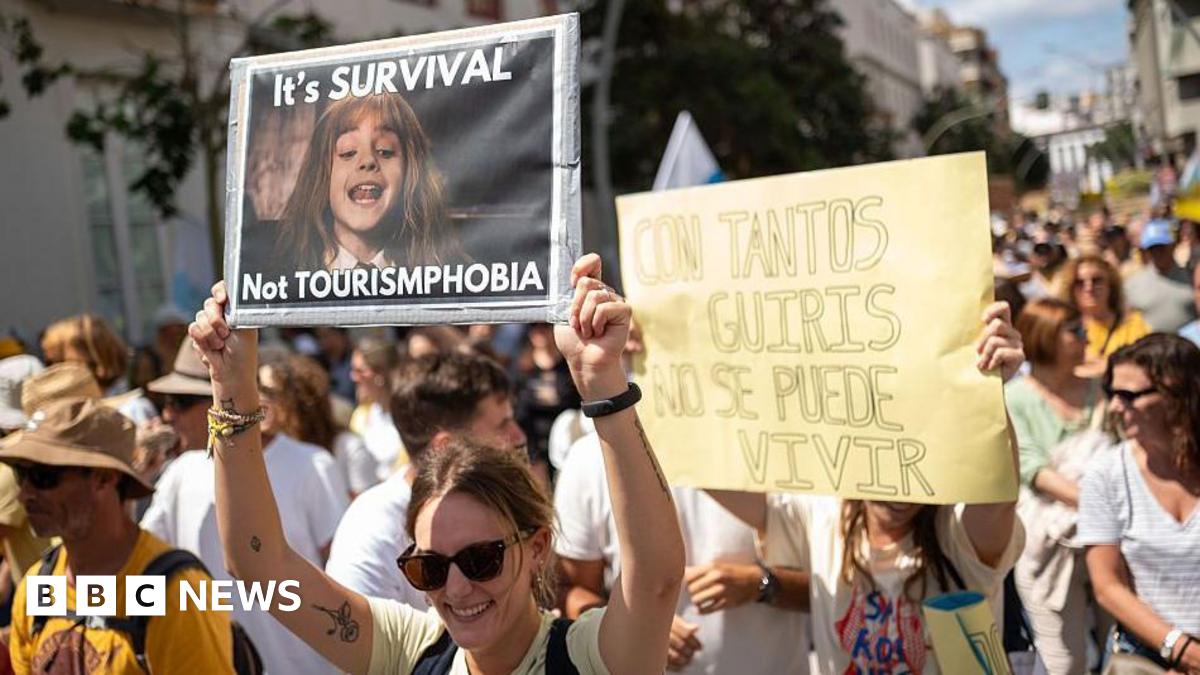Spain Tightens Airbnb Regulations Amidst Rising Tourism

Welcome to your ultimate source for breaking news, trending updates, and in-depth stories from around the world. Whether it's politics, technology, entertainment, sports, or lifestyle, we bring you real-time updates that keep you informed and ahead of the curve.
Our team works tirelessly to ensure you never miss a moment. From the latest developments in global events to the most talked-about topics on social media, our news platform is designed to deliver accurate and timely information, all in one place.
Stay in the know and join thousands of readers who trust us for reliable, up-to-date content. Explore our expertly curated articles and dive deeper into the stories that matter to you. Visit Best Website now and be part of the conversation. Don't miss out on the headlines that shape our world!
Table of Contents
Spain Tightens Airbnb Regulations Amidst Rising Tourism Boom
Spain's vibrant tourism sector, a cornerstone of its economy, is facing a new challenge: the impact of short-term rentals like Airbnb on housing affordability and local communities. The surge in tourism, particularly in popular cities like Barcelona and Palma de Mallorca, has led to a significant rise in property prices and a decrease in long-term rental availability. In response, the Spanish government is tightening regulations on platforms like Airbnb, aiming to strike a balance between supporting the tourism industry and protecting the interests of residents.
The Growing Concerns:
The rapid growth of the short-term rental market has created several key problems:
- Increased Housing Costs: The conversion of residential properties into short-term rentals reduces the number of homes available for long-term leases, driving up rental prices and making it harder for locals to find affordable housing. This is particularly acute in popular tourist destinations.
- Disruption to Local Communities: The influx of tourists associated with short-term rentals can sometimes strain local infrastructure and resources, leading to noise complaints, overflowing waste disposal, and a decline in the quality of life for long-term residents.
- Tax Evasion: Not all short-term rental hosts comply with tax regulations, leading to a loss of revenue for the government. This contributes to the need for stricter enforcement.
New Regulations: A Balancing Act:
The Spanish government's response involves a multi-pronged approach to regulating the short-term rental market:
- Licensing Requirements: Stricter licensing requirements are being implemented, making it more difficult for unregistered properties to operate on platforms like Airbnb. This involves thorough inspections and compliance checks to ensure safety standards and legal operation.
- Tourist Tax Enforcement: Increased efforts to ensure that all short-term rental hosts collect and remit the appropriate tourist taxes are underway. This aims to level the playing field and increase government revenue.
- Limits on Rental Numbers: Some regions are introducing limits on the number of short-term rental licenses available, preventing the market from becoming oversaturated in specific areas. This helps to protect residential areas from being completely taken over by tourist accommodations.
- Community Consultation: Greater emphasis is being placed on involving local communities in the decision-making process regarding short-term rental regulations. This approach aims to address local concerns and find solutions that benefit both tourists and residents.
The Impact on the Tourism Industry:
While the new regulations are designed to address growing concerns, they also pose challenges for the tourism sector. The stricter rules may impact the availability of short-term rental accommodations, potentially affecting tourist numbers and revenue. The industry is adapting by focusing on sustainable tourism practices and exploring alternative accommodation options. This includes promoting responsible tourism and supporting local businesses.
Looking Ahead:
The evolving regulations in Spain represent a complex balancing act. The government aims to maintain Spain's position as a leading tourist destination while simultaneously safeguarding the well-being of its citizens and preserving the character of its communities. The success of these regulations will depend on effective enforcement and ongoing dialogue between the government, the tourism industry, and local communities. It remains to be seen what the long-term effects will be on both the tourism sector and the housing market, but the move highlights a global trend of addressing the impact of short-term rentals on local economies and living conditions. Further updates and analysis will be crucial in fully understanding the outcome of these significant changes.

Thank you for visiting our website, your trusted source for the latest updates and in-depth coverage on Spain Tightens Airbnb Regulations Amidst Rising Tourism. We're committed to keeping you informed with timely and accurate information to meet your curiosity and needs.
If you have any questions, suggestions, or feedback, we'd love to hear from you. Your insights are valuable to us and help us improve to serve you better. Feel free to reach out through our contact page.
Don't forget to bookmark our website and check back regularly for the latest headlines and trending topics. See you next time, and thank you for being part of our growing community!
Featured Posts
-
 Flight Attendant Salary Increases Clawed Back By Ryanair
May 22, 2025
Flight Attendant Salary Increases Clawed Back By Ryanair
May 22, 2025 -
 Buriram United Vs Cong An Ha Noi Fc Jadwal Siaran Langsung Tv And Link Streaming
May 22, 2025
Buriram United Vs Cong An Ha Noi Fc Jadwal Siaran Langsung Tv And Link Streaming
May 22, 2025 -
 Pengumuman Mutasi Petinggi Polri Kapolda Ntt Daniel Tahi Silitonga Dan Wakapolda Ntt
May 22, 2025
Pengumuman Mutasi Petinggi Polri Kapolda Ntt Daniel Tahi Silitonga Dan Wakapolda Ntt
May 22, 2025 -
 Khali The Killer Bioskop Trans Tv Kamis 22 Mei 2025 Jangan Lewatkan
May 22, 2025
Khali The Killer Bioskop Trans Tv Kamis 22 Mei 2025 Jangan Lewatkan
May 22, 2025 -
 Unveiling The 2023 Europa League Winners Prize Money
May 22, 2025
Unveiling The 2023 Europa League Winners Prize Money
May 22, 2025
Latest Posts
-
 Jadwal Tayang And Sinopsis Khali The Killer Bioskop Trans Tv 22 Mei 2025
May 22, 2025
Jadwal Tayang And Sinopsis Khali The Killer Bioskop Trans Tv 22 Mei 2025
May 22, 2025 -
 Al Okhdood Vs Al Raed In Depth Match Preview With Team News And Analysis
May 22, 2025
Al Okhdood Vs Al Raed In Depth Match Preview With Team News And Analysis
May 22, 2025 -
 Harassment And Fear Of Violence Tommy Robinsons Latest Legal Battle
May 22, 2025
Harassment And Fear Of Violence Tommy Robinsons Latest Legal Battle
May 22, 2025 -
 Prediksi Skor Pertandingan Malmo Ff Vs Aik Liga Swedia 23 Mei 2025
May 22, 2025
Prediksi Skor Pertandingan Malmo Ff Vs Aik Liga Swedia 23 Mei 2025
May 22, 2025 -
 Mal Vs Ais Dream11 Prediction Swedish Allsvenskan 2025 Match Preview
May 22, 2025
Mal Vs Ais Dream11 Prediction Swedish Allsvenskan 2025 Match Preview
May 22, 2025 -
 Al Okhdood Vs Al Raed Ramalan Skor Liga Pro Saudi 22 Mei 2025
May 22, 2025
Al Okhdood Vs Al Raed Ramalan Skor Liga Pro Saudi 22 Mei 2025
May 22, 2025 -
 Liga Pro Saudi Prediksi Damac Vs Al Fateh 22 Mei 2025 Siapa Yang Menang
May 22, 2025
Liga Pro Saudi Prediksi Damac Vs Al Fateh 22 Mei 2025 Siapa Yang Menang
May 22, 2025 -
 U Turn On Winter Fuel Payments Keir Starmers Policy Shift Explained
May 22, 2025
U Turn On Winter Fuel Payments Keir Starmers Policy Shift Explained
May 22, 2025 -
 Dream League Season 26 Key Strategies And Player Performances In Falcons Vs Team Name
May 22, 2025
Dream League Season 26 Key Strategies And Player Performances In Falcons Vs Team Name
May 22, 2025 -
 Khali The Killer Sinopsis Film And Kisah Penebusan Pembunuh Bayaran
May 22, 2025
Khali The Killer Sinopsis Film And Kisah Penebusan Pembunuh Bayaran
May 22, 2025
